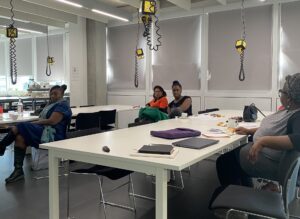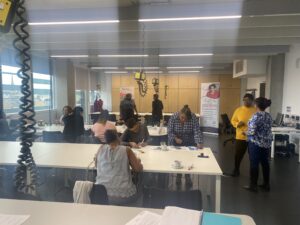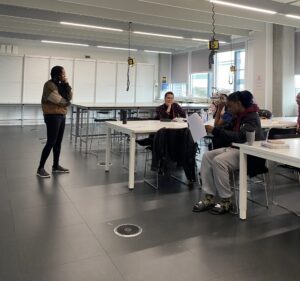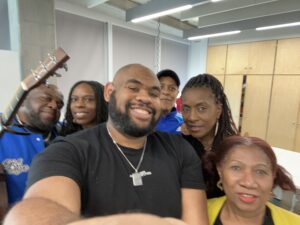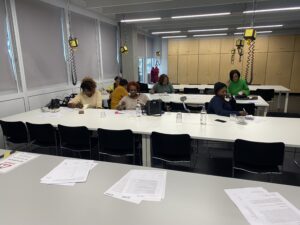Subscribe to our newsletter to keep up to date on all of our latest events, projects and news.
SubscribeHow did the Windrush NHS Stories Workshops go?
13 March 2023 - StoryTo commemorate the 75th Anniversary of the Windrush, Manchester Metropolitan University, in partnership with Manchester City of Literature, have been delivering the NHS Windrush Stories project.
Working alongside Manchester City of Literature Community Champion, Jackie Bailey, we devised an exciting programme of workshops for African Caribbean NHS workers (past and present) and their families and communities to explore their experiences of contributing to the NHS Story.
Central to all the workshops is the idea that we wanted to empower the participants to tell their authentic Windrush stories; be they ‘happy’ stories, ‘sad’ stories or stories which are so nuanced that they sit somewhere in between.
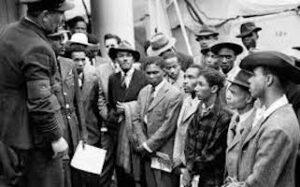
The Workshops
We delivered 6 unique workshops, each exploring a different form of creative writing, to give our participants access to a breadth of creative outlets for their stories, whilst also giving them the chance to interact with award-winning writers and literature professionals. I had the joy of attending the workshops, getting to know the participants and hearing some of their stories first hand.
Read on to find out more.
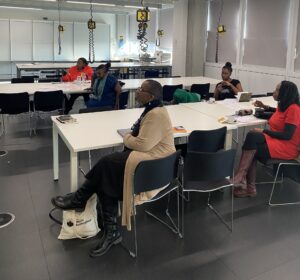
Workshop 1: Autobiographical and Narrative Poetry with Shirley May
Opening with a stunning poem and accompanying visual written and produced by Ellouise Bridge, which explores the Windrush story, Shirley set the tone for a deeply insightful and purposeful workshop.
Shirley is the author of She Wrote Her Own Eulogy, a moving collection of poetry which centres around the experience of her Jamaican mother, who was a part of the Windrush generation.
In the workshop, Shirley introduced the participants to freewriting, word banks and some key elements of writing autobiographical poems including descriptive language, voice and character.
The participants were able to explore in verse, their experiences as descendants of NHS workers. They shared memories of their parents’ working nightshifts, the uniforms and sisterhood that existed between nurses on the wards.
Workshop 2: Memory and Reflective Journaling with Jackie Bailey
This workshop centred on the power of memory as a tool for wellbeing. Jackie introduced participants to journaling as a way of exploring their emotional responses to lived experiences.
Through discussion, Jackie encouraged participants to reflect on their memories of NHS service (or being from families or communities that contributed to the Windrush) and think about how that contribution has or hasn’t been recognised in wider conversations about the value of the NHS.
There were some beautiful moments of reflection. Some of the participants spoke passionately about the pressures to perform, that Windrush generation NHS workers felt being the ‘other’, how they were often overlooked from promotions in favour of less experienced British-born colleagues and the impact this has on their sense of recognition of the contribution Windrush workers made to the NHS.
Workshop 3: Memoir Writing with Tarnya Coley
Award-Winning Memoir Writer and Mentor, Tarnya Coley is a real exponent of the power of memoir writing and, in this workshop, she shared with the participants how they can tap into their own unique stories.
Tarnya reflected on her own personal experiences that led her to write Open Doors, her debut memoir, and how liberating it felt to share the story with the world. She spoke about some of the key elements of memoir writing such as transparency, intrigue and emotional depth, encouraging the participants to believe that their stories are worth sharing.
By the end of the workshop, the participants were able to give their memoirs a title and synopsis and they had completed the first page of their NHS themed memoir.
Another gem of a workshop!
Workshop 4: Scriptwriting with Keisha Thompson
Keisha Thompson, CEO/AD of Contact Theatre and an award-winning writer, delivered a phenomenal workshop on the power of scriptwriting. Keisha introduced the participants to extracts from her own work, including her solo show ‘Man on the Moon’, to illustrate how the everyday can become theatrical and otherworldly.
Across the text she shared, the personhood of Black people really shone through. In one extract, Keisha showed the participants how themes of mental health, colonialism, identity, religion, and father/daughter relationships can all be authentically present in a short script.
Keisha also spoke about how scriptwriting gives the writer the benefit of being able to draw on their own personal experiences as source material, but also allows the writer to abstract facts to make the scenes more striking or simply to protect the writer and guard their truth.
The participants had the chance to write some Windrush focused scripts and the results were truly beautiful.
Workshop 5: Spoken Word, Lyrics and Music with Sefton Simpson and Reece Williams
For the first time in this series of workshops, I got to think with my facilitator/artist hat on.
Sefton and I led a conversation all about the participants feelings of all the sacrifices that were made by Windrush generation NHS workers and their families. We spoke about the sisterhood that existed amongst nurses, the families that they left behind at home whilst working night shifts. We spoke about the feeling of (often) being undervalued by management and overlooked for promotions.
We arrived at a conclusion; we’d like the world to see and feel how they felt. Sefton suggested we adapt the classic ‘Do You Hear What I hear’ by Harry Simeone, telling the story of Windrush nurses in the NHS.
What we produced was truly beautiful. Below you can read a preview of the lyrics to the song we called ‘Our Unseen Service and Sacrifices’.
“For generations we’ve provided patient care/
Not just needles, we were combing hair/
Do you see what I see?
Nursing strangers whilst our loved ones were back home/
Hoisting patients from their sick beds on our own/
Do you see what I see?”
Workshop 6: Fantasy and Belonging with Micah Yongo
The last (say ‘awwww’) workshop and what a way to conclude our series. Micah Yongo delivered an amazing workshop all about the power of storytelling and the often blurred lines between fantasy and reality.
We played a story game which challenged the participants to work secretly in groups and share true stories with each other. The group then had the task of either sharing one of their true stories with the rest of the group, or sharing an entirely made up story. Not only was it really hard to tell which stories were true and false, it also demonstrated just how exceptional our group are at telling stories (whether autobiographical or fiction).
Micah drew on stories written by Chimamanda Ngozi Adichie to demonstrate how as writers we can create a world that is vivid and alive with detail. He set the group a task of writing a fantasy short story that reflected on the themes of Windrush but that was rooted in truth and lived experiences.
You know you’ve had a brilliant workshop when you run over by an hour, right?

